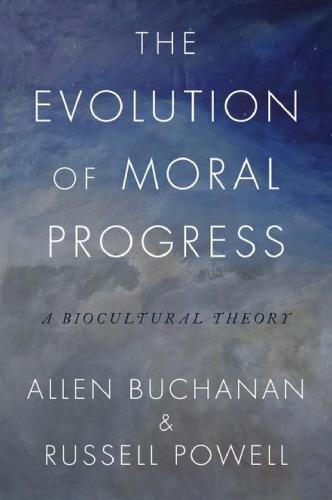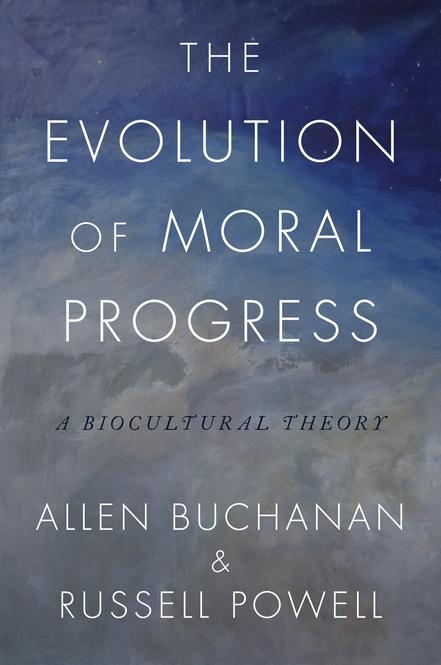THE EVOLUTION OF MORAL PROGRESS
a biocultural theory
ALLEN BUCHANAN AND RUSSELL POWELL
Oxford University Press is a department of the University of Oxford. It furthers the University’s objective of excellence in research, scholarship, and education by publishing worldwide. Oxford is a registered trade mark of Oxford University Press in the UK and certain other countries.
Published in the United States of America by Oxford University Press 198 Madison Avenue, New York, NY 10016, United States of America.
© Oxford University Press 2018
All rights reserved. No part of this publication may be reproduced, stored in a retrieval system, or transmitted, in any form or by any means, without the prior permission in writing of Oxford University Press, or as expressly permitted by law, by license, or under terms agreed with the appropriate reproduction rights organization. Inquiries concerning reproduction outside the scope of the above should be sent to the Rights Department, Oxford University Press, at the address above.
You must not circulate this work in any other form and you must impose this same condition on any acquirer.
CIP data is on file at the Library of Congress
ISBN 978–0–19–086841–3
1 3 5 7 9 8 6 4 2
Printed by Sheridan Books, Inc., United States of America
INTRODUCTION: WHY A THEORY OF MORAL PROGRESS IS NEEDED 1
PART I: WHAT IS MORAL PROGRESS?
1. A TYPOLOGY OF MORAL PROGRESS 45
2. CONTEMPORARY ACCOUNTS OF MORAL PROGRESS 67
3. A PLURALISTIC, DYNAMIC CONCEPTION OF MORAL PROGRESS 92
PART II: EVOLUTION AND THE POSSIBILITY OF MORAL PROGRESS
4. IS EVOLVED HUMAN NATURE AN OBSTACLE TO MORAL PROGRESS? 115
5. THE INCLUSIVIST ANOMALY AND THE LIMITS OF EVOLUTIONARY EXPLANATION 153
6. TOWARD A NATURALISTIC THEORY OF INCLUSIVIST MORAL PROGRESS 187
7. NATURALIZING MORAL REGRESSION: A BIOCULTURAL ACCOUNT 218
8. DE-MORALIZATION AND THE EVOLUTION OF INVALID MORAL NORMS 239
PREFACE
Whether there has been moral progress and whether it can be achieved now or in the future are surely among the most important questions human beings can ask. Yet in spite of a recent bourgeoning of systematic philosophical inquiry in moral and political philosophy across a remarkably wide range of topics, these remain neglected questions. It was not always so. Until the twentieth century, liberal political thought—which today remains the most developed system of thinking about the morality of political institutions—was centrally preoccupied with the topic of moral progress. This volume is an attempt to begin the task of making moral progress a respectable topic once again, one worthy of the attention of philosophers and of thoughtful people generally.
This is an unusual book, and not just because it navigates the largely unfamiliar conceptual terrain of moral progress. It is also unusually interdisciplinary, drawing on diverse literatures in moral and political philosophy, evolutionary biology, evolutionary psychology, anthropology, sociology, and history. One of the authors, Allen Buchanan, was trained as an analytic philosopher—that is, as someone who was taught that tackling philosophical problems requires only the ability to construct hypothetical (and often outlandish) examples to prompt moral intuitions, to make fine distinctions, and to reason logically from premises designed to generalize from particular, firmly held, and stable intuitions. Put less charitably, Buchanan, like everyone else in his generation of analytic philosophers, was led to believe that to solve philosophical problems one need not know anything about the world and that indeed such knowledge is a dangerous distraction from the proper task of the philosopher. The other author, Russell Powell, is trained in law, biology, bioethics, and
viii Preface
the philosophy of science and is of a younger generation of philosophers who tend to appreciate the need for interdisciplinary work—and for attention to facts and scientific theory—more so than most philosophers of Buchanan’s generation.
Both authors are thoroughly committed to interdisciplinary work and recognize that for those philosophical problems that require an interdisciplinary approach, co-authorship is almost always a necessity. One person, even if she is committed to learning from disciplines other than the one in which she was primarily trained, often cannot know enough to engage with these topics effectively. This is especially true for the philosophical problems tackled in this book, which require integrating work in moral and political philosophy with the conceptual and methodological resources of biological, cultural, and social sciences.
The authors of this book are unabashedly committed to “naturalism” in philosophy: they believe that fruitful engagement with at least some of the most significant philosophical problems requires recourse to scientific knowledge, including the best available theory and data. That is not to say, of course, that science can replace philosophy in these matters. Instead, the idea is that while traditional analytic philosophical skills of analysis and reasoning are necessary for addressing challenging philosophical problems, sometimes they are not sufficient. Whether naturalism is the correct way to do philosophy—or at least a correct way— can only be determined by ascertaining the quality of the best examples of that approach. We believe that this book is one of the most thoroughly developed, systematic attempts at naturalistic moral and political philosophy currently available. At the same time, it shows how contemporary work in ethics and political philosophy can inform our best scientific theories of morality, in part by drawing attention to theoretically important aspects of human moral thought and behavior that moral scientists and philosophers of science have tended to overlook. It also corrects for other flaws that commonly arise in the course of attempts to do naturalistic philosophy such as the tendency to go too lightly
Preface ix
on the analytic component of the enterprise, to overinterpret purported scientific findings (and in particular to overestimate their implications for traditional philosophical problems), and to cherry-pick scientific studies, attending only to those that support philosophical views one already holds.
We think this book may also do something to remedy what we take to be a serious deficiency of contemporary philosophy and more broadly of the culture of educated people today: namely, a failure to assimilate fully the Darwinian revolution in biology and to appreciate its profound implications for how humanity should think about itself. In our experience, educated people, including professional philosophers, may use the language of Darwinian theory and pay face time to its significance but nonetheless still cling, implicitly or explicitly, to pre-Darwinian, teleological views of nature (and human nature). That is one mistake to be assiduously avoided. The flip side is a tendency among some philosophers and scientists to fetishize Darwinian evolutionary theory and to assume that the possibilities for human morality are tightly constrained by the psychology that natural selection, working on the genetic components of thought and behavior, solidified in human beings many millennia ago. This mistaken evolutionary “determinist” view fosters an equally erroneous normative view that we characterize as “evoconservatism”: an unduly pessimistic understanding of the possibilities for moral improvement based on a failure to appreciate how culture has not only liberated us from but, more importantly, transformed our evolved moral nature.
Every chapter of this book demonstrates both that an understanding of evolutionary processes is necessary for thinking fruitfully about moral progress (and regression) and that it is not sufficient because culture can stretch the evolutionary leash and produce results that could not be anticipated if one made the mistake of thinking that morality as it first originated is essentially the same as the morality we have, and struggle with, today. This book is not, therefore, an attempt to replace moral philosophy
x Preface with evolutionary science; rather, it draws on evolutionary science and the philosophy thereof to help make moral philosophy more fruitful and more practically relevant to the moral problems that confront humanity in the twenty-first century.
The theory of moral progress developed in these pages has a dual aspect: it provides guidance not only for how to achieve some especially important types of moral progress but also for how to avoid moral regression. So even if one thinks that human moral progress has approached its limit, one should still find this book of use since it illuminates the question of how to preserve the moral advances that humans have achieved thus far. In our less optimistic moments, we are inclined to think that the first order of business is to prevent regression. This feels especially true now, given the recent wave of nativism, hypernationalism, authoritarianism, and xenophobia that has swept the globe and is straining progressive political institutions—from human rights and climate change agreements to the basic principles of constitutional democracy and rule of law itself—to the breaking point.
In Chapter 7 of this volume, we develop an account of moral regression in which the exaggeration of “out-group threat cues” can trigger the development of tribal moral responses and hence the dismantling of inclusivist institutions. This response was likely adaptive in the prehistoric environments in which some of the basic features of human moral psychology were formed; but in the modern world, it is subject to deliberate demagogic manipulation. Out-group threat cues include anything that reliably provokes primal fears of physical violence by members of other groups, the danger of parasitic diseases spread by outgroup members, the expropriation of the fruits of cooperation by “social parasites” in our midst (free-riders on intragroup cooperation) especially in the context of perceived resource scarcity, “alien” ideas or values or challenges to in-group identity that could undermine norms of cooperation in one’s own group, and the prospect that “we” are in a no-holds-barred competition for vital resources with “them.”
Preface
While we were in the midst of writing this chapter on moral regression, a U.S. presidential candidate was employing all of the techniques for fostering moral regression that we discuss. As president of the United States, Trump has continued his assault on inclusivist norms and institutions and the social-epistemic foundations on which those institutions rest, expertly employing the very tactics that we discuss in this book. Trump’s demagoguery is particularly effective because of the large number of out-group threat cues that it deploys and disseminates through social media and because of its systematic manipulation of the social moral information space resulting in massive shifts of popular perception. It is probably not hyperbolic to say that if all of Trump’s publicly avowed commitments were realized, they would dismantle some of the more important inclusivist achievements in the United States of the last century and, indeed, since the founding of the Republic. Similar tactics can be seen in other countries, with proto-fascist and extreme nationalist sentiments on the rise globally, as we have seen in Turkey and eastern Europe. Whether our most progressive cultural moral innovations can resist this pressure remains to be seen. A central aim of this book is to better understand the biocultural conditions that give rise to, and exacerbate, these troubling moral trends. One can always hope, nonetheless, that conditions will eventually become more favorable to progressive moralities, either spontaneously or by design, and that, when they do, our goal once again should be to strive for moral improvement.
INTRODUCTION
Why a Theory of Moral Progress Is Needed
Martin Luther King, Jr., paraphrasing the words of nineteenthcentury abolitionist Theodore Parker, famously proclaimed that “the arc of the moral universe is long, but it bends toward justice.” Yet if you ask people, even very knowledgeable people, whether they think there is such a thing as moral progress, you often get either a blank look or a skeptical response: technological progress, obviously; scientific progress, of course; but moral progress? Some even respond with indignation, saying that, on the contrary, there has been moral regression—that from a moral point of view things have gotten worse, not better. Indeed, many people think that the last century is perhaps the most violent ever (given two world wars and the Holocaust), that people are more selfish and less virtuous now than they used to be, that public political debate is less civil, that government is more corrupt, that countries are less stable, that warfare has become more barbaric, that terrorism has increased, that inequality has grown, and so on.
This sort of “Golden Age thinking” has deep roots in the academy. Indeed, there is a feisty, iconoclastic philosophical tradition, running from Rousseau to Alastair MacIntyre, proclaiming that modern societies are morally degenerate, not progressive— that, morally speaking, things have deteriorated rather than gotten better. Similarly, many cultural anthropologists have insisted that aggressive warfare and genocide are not prehistoric components
2 Introduction
of human nature but rather the result of pernicious cultural norms that arose more recently in human history and that have lured us away from our more cooperative, peaceful past.1
Yet with a little reflection, the denial of moral progress seems absurd and skepticism about moral progress deeply misplaced, puzzling, and, above all, ungrateful. For shining examples of moral progress are not hard to come by: consider, for example, the change from a world in which slavery was ubiquitous and accepted as natural to one in which it is universally condemned and no longer the lot of the majority of humankind, the increasing recognition of the equal rights of women in many societies, the growing recognition in belief and practice that there are moral limits on how we may treat (at least some) non-human animals, the abolition of cruel punishments in many countries and of the cruellest punishments virtually everywhere, the notion that war must be morally justified, and the acknowledgment and (admittedly imperfect) institutionalization of the idea that the people are ultimately sovereign or at least that government should serve the people rather than the other way around. And this list is far from exhaustive. It is hard to understand how these changes are so often overlooked, given how transformational many of them have been.
Consider British abolition. The outstanding historian of slavery and emancipation Seymour Drescher eloquently captures just how momentous this change was:
Emancipation was . . . an act without precedent in history. On a single day in 1834, 800,000 slaves had been called from social death to life. Neither at the announcement of coming freedom nor at the
1 This view is evident, for example, in the Seville Statement of 1986 on the biology of human aggression, adopted by UNESCO and endorsed by numerous social scientific associations. See D. Adams and J. Buchanan (1990), “The Seville Statement on Violence,” American Psychologist 45(10): 1167–1168. As we discuss in Chapter 5, in recent years there has been a shift toward a much less rosy view of premodern societies.
moment of implementation had it produced “a single insurrection,” nor had it “cost the life of a single man.”2
“Emancipation,” Drescher continues, “was a peaceful reform generated from below and pursued for half a century. It was the act of a nation and not of its rulers. English governments struggled as long as they could against the adoption of every major step toward emancipation, from the abolition of the slave trade to the abolition of slavery.”3
The case of British abolition illustrates an ironic fact about moral progress: once it occurs, we tend to take it for granted or at least to underestimate its significance. Slavery has been called “the peculiar institution.” But, in fact, across the long sweep of human history, freedom is the peculiar institution.4 When we think of freedom as the normal condition of most human beings and slavery as the abnormal condition, we ignore the fact that until very recently slavery in one form or another was ubiquitous, and thus we undervalue and underestimate the great innovation and dramatic reversal that was emancipation.
Similarly, if we think that democracy is the norm, we fail to appreciate how rare, recent, and (perhaps) fragile the achievement of democratic governance is. Or consider sorcery (witchcraft): most human beings until very recently did not have the concept of a fortuitous harm—that is, they assumed that any harm that befell
2 Seymour Drescher, Abolition—A History of Slavery and Antislavery (Cambridge University Press, 2009, p. 264).
3 British abolition was all the more impressive as an instance of moral progress, then, because it was democratic and peaceful, rather than top-down and violent. In contrast, the abolition of American slavery was far from peaceful: about 700,000 human beings perished in the Civil War. It is a shameful fact that the United States was the only country that required a bloody civil war to abolish slavery. (This is not the sort of “American exceptionalism” that conservatives like to talk about.) Further, the beginning of American emancipation was an executive order, The Emancipation Proclamation, framed by President Lincoln not as a democratic legislative act but as a wartime emergency provision.
4 Drescher, Abolition, supra note 2, pp. ix–x.
4 Introduction
them was the result of an intentional act, either by a god or by a malicious human being who had put a spell on them. The ubiquitous belief in sorcery was immensely destructive, often resulting in what was widely regarded as proper retaliation to malevolent magic but was in fact unjustified, often lethal aggression against innocent people. The belief in sorcery also poisoned perfectly benign relationships, fed paranoia, and undermined social solidarity. Fortunately, human beings now take it for granted that there are nonintentional harms and that many harms are not the result of any kind of agency at all, whether benign or malicious. The belief in sorcery still persists in some quarters—and still does horrible damage—but, as with slavery, where it has been abandoned people tend to be unaware of how progressive its abandonment really was. Moral progress, then, is like oxygen: when it exists, we don’t tend to notice it, even though our well-being depends on it. Yet since all of the changes listed above are undeniable—and undeniably good from a moral point of view—why are many people skeptical, uncertain, or silent about moral progress? The puzzlement only deepens if we consider the fact that the idea of moral progress took center stage in liberal political thought from the Enlightenment through the nineteenth century but is now largely absent from philosophical discourse or is addressed only indirectly, cursorily, or ambiguously. What explains the veritable disappearance of systematic thinking about moral progress from liberal thought?
Explaining the Disappearance of the Concept of Moral Progress
One must not overstate the case—neglect of the concept of moral progress has not been total. Very recently, several analytic philosophers have had something valuable to say about moral progress, and we shall engage with their views in the next chapter. However, their discussions of moral progress fall well short of a full-fledged theory. What can account for the lack of systematic theorizing about moral progress, as well as the
5 common skepticism about the existence of moral progress? We can imagine several plausible, mutually non-exclusive explanations. Each of these explanations is credible as an explanation but not as a justification—that is to say, none is a good reason for abandoning the idea of moral progress or forgoing attempts to theorize it without further ado.
First, as we have already suggested, some think that the horrors of the two world wars and the Holocaust, and perhaps the more recent rise of Islamic State and its unprecedented genocidal brutality in attempting to establish a caliphate in the Middle East, show that belief in moral progress is a delusion. However, the bloodbaths of the twentieth and early twenty-first century do not rule out the possibility of moral progress, past or future; acknowledging them only requires that one abandon linear conceptions of moral progress—conceptions that require continuous progress or at least rule out major regressions. Some theories of moral progress have postulated laws governing predictable stages of development through which societies or civilizations were supposed to pass, and these nomological assumptions have prevented them from taking the possibility of regression seriously. But the notion of an inexorable, continuous march of moral advance is certainly not an essential feature of the idea of moral progress, let alone one that is empirically supported given the staggered historical trajectory of moral progress. Further, as historians of large-scale armed conflict have shown, even if the first half of the twentieth century featured extraordinarily violent mass conflicts, war in the second half has declined significantly. More importantly, periods of moral regression— such as the cataclysmic events of the first half of the twentieth century—are compatible with moral progress in the long run. The long-term trend (at least since ~1450 C.E.) is one of remarkable reductions in homicide rates in many regions of the world, even if war deaths are included.5
5 See Steven Pinker, The Better Angels of Our Nature (Viking, 2011).
Theodore Parker conceded that he was not in a position to directly observe or calculate the long-term arc of the moral universe; instead, he had to “divine it by conscience.” Thanks to rigorous empirical work on large-scale trends in violence, slavery, and other features of our evolving moral world, we are now in a much better position to calculate some important dimensions of the moral arc—and we can now say with reasonable credence that, at least in respect of these dimensions, Parker and King’s optimism was justified.
A second source of skepticism about the possibility of a theory of moral progress may be doubts about the possibility of making global (all-things-considered) assessments of progress, as when one society is said to be more morally progressive than another or when the same society is said to be more morally progressive at one time than at another. Local moral progress assessments, in contrast, do not venture to make all-things-considered evaluations. Instead, they assert, for example, that there has been progress in reducing racial or gender discrimination or in abolishing slavery, without assuming that there is moral progress overall—a judgment that would necessarily take into account all other dimensions of morality. If global moral progress assessments are problematic, Parker and King would only be justified in rendering specific moral progress judgments about abolition or racial discrimination and not about the arc of the moral universe itself.
It might turn out—and it is too early in our investigation to tell—that global (all-things-considered) assessments of moral progress cannot be justified for either of two reasons. First, it might be that in any given case there are moral gains and moral losses and that some of these are incommensurable, that it is impossible to measure them on a common scale and determine whether there has been net moral progress by subtracting the losses from the gains. For example, the rise and dominance of market economies have no doubt produced much good—raising standards of living for most people and, according to Norbert Elias, Stephen Pinker, and others, contributing to a dramatic
reduction in homicide rates. But market economies also arguably encouraged the growth of slavery and colonial domination and produced considerable misery for the first generation of workers in the Industrial Revolution. How are we to sum up, balance, or compare these gains and losses? Even if all moral gains and losses were commensurable and global (as opposed to merely local) moral progress assessments were justified in principle, the complexity of the calculation might be so great that reliable assessments of net gain or loss are beyond our powers, at least at present. Thus, if one assumes that any theory of moral progress that warrants the title must include global progress assessments, then one will have good reason to doubt the feasibility of the project. Note, however, that these same difficulties afflict attempts to make global moral regression judgments, such as those of Rousseau and MacIntyre alluded to above.
While it is true that many previous attempts to theorize moral progress have assumed, without good reason, that global assessments could be made, one should not presume that any worthwhile theory of moral progress must include global, as opposed to local, moral progress assessments. This book will focus on identifying and understanding various types of moral improvements, without venturing all-things-considered judgments about moral progress. The Conclusion, however, will return to the question of global moral progress assessments and argue that whether they are justifiable will depend upon whether our best normative moral theories allow us to strongly rank moral values or principles. We will conclude that on any plausible ranking of moral values and principles, the global degeneration thesis must be rejected.
A third possible motivation for the neglect of or skepticism about a theory of moral progress is the notion that a proper acknowledgment of moral pluralism—the view that there is a plurality of valid or reasonable moralities—renders the notion of moral progress uninteresting by ruling out the possibility of moral progress for humanity as a whole, as opposed to moral
8
Introduction
progress for particular moral traditions or cultures. However, acknowledging some degree of moral pluralism does not rule out the possibility of meaningful moral progress. Suppose that there is a plurality of reasonable moralities, each matched, as it were, to different ecological conditions in which human beings may find themselves; but in addition, suppose that they all share some fundamental moral norms because every viable morality must address certain universal features of the human predicament. Increased commitment or conformity to these fundamental norms could count as moral progress even if there remained great diversity in other norms due to the peculiarities of history and local ecology. So, even if it is highly unlikely that there will be complete agreement on any one particular morality—and even if there is no reason to think that there should be—this is compatible with increasing convergence on some important moral norms (such as basic human rights) and with moral progress being gauged in terms of compliance with those norms.6
A fourth and related source of skepticism about attempts to theorize moral progress stems from the perceived perils of using the concept of moral progress, even if this is done with good intentions. Reflecting on atrocities committed in the name of moral progress by agents of colonialism and imperialism, some people may conclude that the idea is simply too dangerous to
6 For example, the idea of human rights apparently originated in the West but now has become incorporated into the moral outlooks of people from many different cultures. See Allen Buchanan, “Moral Progress and Human Rights,” in Cindy Holder and David Reidy (eds.), Human Rights: The Hard Questions (Cambridge University Press, 2013, pp. 399–417). Likewise, more widespread acknowledgment of the fact of reasonable pluralism, if it results in greater tolerance of reasonable differences in moral belief, could also count as moral progress. Even if there are no shared fundamental moral norms among reasonable moralities, the question of whether there has been or can be moral progress from the standpoint of some particular reasonable morality may still be worth addressing. For example, it should matter for those whose moral outlook is liberal whether there has been or is likely to be moral progress as judged from that perspective.
9 be employed. Now it is undeniable that the concept of moral progress is subject to abuse, but this is true of many other moral concepts that are indispensable. Consider the concepts of the right of self-defense and of just war: these concepts have been used to rationalize morally unjustified aggression, and yet this lamentable sociological fact does not warrant their abandonment. Rather than leading us to jettison the idea of moral progress, the fact that the concept has been misused should compel us to reflect critically on our confidence in making judgments about moral progress and to carefully scrutinize the political roles that the idea of moral progress should or should not play.
Reluctance to acknowledge the existence of moral progress may also reflect a concern that in doing so we run the risk of obscuring the great moral failures of our time. Recognizing major moral victories may be seen as objectionably self-congratulatory in ways that could impede further moral progress by enervating current efforts at reform or by distracting us from what remains to be done. Yet clearly there is no logical tension between our willingness to recognize moral gains and our ability to identify further areas for improvement; nor is it evident that there is a psychological tension. Indeed, recognizing our moral achievements and that our progressive social movements can succeed even in the face of overwhelming opposition can energize, rather than enervate, further efforts at moral reform, as it arguably has done in the case of the ever-expanding civil rights movement.
However, even if the perils of employing the concept of moral progress can be adequately mitigated, skepticism of the project may remain due to the idea that a notion of moral progress that is free of cultural bias is impossible to achieve. Given the fact that virtually all earlier attempts to think seriously and systematically about moral progress have been marred by racial, gender, class, or ethnonational bias, people who are acutely aware that all human beings, now as before, are afflicted by prejudice may simply conclude that constructing an unbiased theory is beyond our capacities. While it is true that previous efforts to theorize













